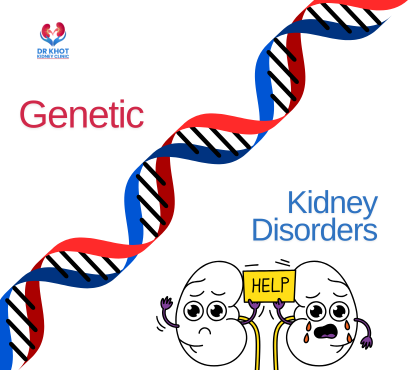Kidney disease often progresses silently until serious damage occurs. While lifestyle and chronic conditions contribute, many people are unaware that genetics can play a major role. Hereditary kidney conditions may run unnoticed in families and accelerate organ damage. Understanding your genetic risk gives you a head start: early detection, treatment, and lifestyle adjustments can slow or prevent worsening disease.
Two of the most common genetic kidney disorders in Indian contexts are Autosomal Dominant Polycystic Kidney Disease (ADPKD) and Alport Syndrome, with rarer ones like Fabry Disease also emerging. This guide explores each condition, genetic inheritance patterns, early warning signs, diagnostics, and how practical interventions can protect your kidney health.
2 | How Genetic Kidney Disorders Work
All genetic kidney disorders are caused by inherited gene mutations that affect the structure or function of kidney tissues.
- Autosomal Dominant (e.g., ADPKD): A single mutated gene from one parent is enough; each child has a 50% chance.
- Autosomal Recessive (rare): Both parents must pass a mutated gene; risk is 25%.
- X‑linked (e.g., Alport, Fabry): Mutations on X‑chromosomes primarily affect males; females may be carriers or mildly affected.
These mutations disturb vital kidney structures—leading to cysts, scarring, protein leakage, or inadequate filtration.
3 | Major Genetic Kidney Conditions
A. ADPKD (Autosomal Dominant Polycystic Kidney Disease)
- Causes cysts in both kidneys, often starting between ages 30–50.
- Symptoms: abdominal pain, kidney enlargement, high BP, flank pain.
- 50% may need dialysis/transplant by age 60 if uncontrolled.
- Associated complications: liver cysts, aneurysm risk, stones, infections.
B. Alport Syndrome
- Affects collagen supporting glomeruli (blood-filtering units).
- Symptoms: blood in urine, proteinuria, progressive hearing loss.
- May proceed to dialysis within 30–40 years if untreated.
C. Fabry Disease
- An X‑linked enzyme deficiency (alpha-galactosidase A) causes lipid buildup.
- Symptoms: burning sensation in hands/feet, low sweating, proteinuria, kidney decline.
- Early enzyme therapy can slow progression.
Other rare conditions like Cystinosis, Tuberous Sclerosis, and Lowe syndrome can also impact kidneys genetically.
4 | Warning Signs and Risk Detection
Be alert if you have one or more of the following:
- Family history of kidney failure, dialysis, PKD, or hearing loss
- Recurrent hematuria in young adults or adolescents
- High blood pressure under age 40
- Unexplained protein leakage or kidney scarring
- Cysts detected in routine ultrasound (even when asymptomatic)
Early signs may be mild; also consider symptom vigilance for children—hematuria in Alport, burning hands in Fabry, etc.
5 | Diagnostic Tools
| Test | What It Detects | When to Use |
| Renal Ultrasound | Kidney size, cysts, structure | First-line for suspected PKD |
| Urine Analysis | Blood, protein | Detects hematuria/proteinuria early |
| Genetic Testing | Specific mutations | Confirms diagnosis, helps family screening |
| Blood Tests | eGFR, creatinine | Tracks kidney function regularly |
| Hearing Tests | Audiometry | Detects hearing loss in Alport |
| Enzyme Assay | α‑galactosidase A activity | Screen for Fabry disease |
6 | Managing Genetic Kidney Diseases
While gene mutations cannot be cured, precise treatment and lifestyle changes can slow progression and preserve kidney function.
A. Blood Pressure Control
- Maintain target <130/80 mmHg using ACE inhibitors or ARBs—reduces scarring and proteinuria.
B. Proteinuria Management
- Medications to reduce protein leakage protect kidney filters.
C. Dietary Adjustments
- Low sodium intake (<2 g/day), moderate protein (~0.8 g/kg), sufficient hydration—essential for supportive care.
D. PKD-Specific Treatment
- Medications like tolvaptan can slow cyst growth in early stages (stage 1–3) with precautions like liver monitoring.
- Ensure hydration and avoid caffeine.
E. Alport Management
- Early ACE inhibitors delay progression; hearing aids may help.
F. Enzyme Therapy for Fabry
- Administered intravenously, slowing kidney decline and improving symptoms.
G. Lifestyle & Screening
- Healthy weight, avoid smoking, regular exercise, lipid and cardiovascular control.
- Monitor annually with function tests, imaging, blood pressure, hearing, and enzyme levels as needed.
H. Dialysis & Transplantation
- In advanced stages, timely renal replacement therapy with living donor transplants shows better outcomes.
7 | Living with Hereditary Kidney Conditions
A. Psychological Preparation
- Genetic counseling is vital. Join support groups and learn from peer experiences.
B. Reproductive Decisions
- Discuss risk with partners. Prenatal testing available for PKD, Alport, and Fabry inheritance.
C. Maintain Treatment & Lifestyle
- Adherence to medications, dietary changes, and screening significantly improves long-term prognosis.
D. Traveling & Work
- Medication storage, regular health checks, early infection detection—all matter when away from home.
E. Health Optimization
- Consider vaccination (flu, pneumococcal), avoid nephrotoxic drugs, manage kidney stones.
8 | Timeline of Affected Organs & Symptoms
- ADPKD picks often from 30–50 years; kidney enlargement and hypertension are earliest signs.
- Alport starts in childhood with hematuria, hearing loss in adolescence.
- Fabry symptoms appear in childhood/adolescence; kidney function decline in adulthood.
Prompt detection delays dialysis by years—even decades.
Genetic kidney disorders can silently progress—but armed with awareness, early testing, and proactive care, progression can be significantly slowed. If there’s a family history or early warning signs, consult a nephrologist. With timely intervention, it’s possible to live decades full, healthy lives despite genetic risk.
FAQ
- What should I do if a parent has PKD?
Begin with an ultrasound at age 20–30 and annual kidney monitoring. Discuss genetic testing and early therapy with a nephrologist. - Can lifestyle delay hereditary kidney disease?
Yes—controlling blood pressure, eating a balanced diet, avoiding salt, and regular screenings significantly slow kidney decline. - 3. Are gene therapies available?
Not yet. Current research is ongoing for PKD and Fabry. Meanwhile, existing treatments (e.g. ACE inhibitors, enzyme therapy) remain effective.

